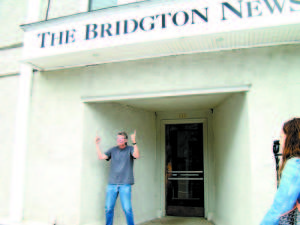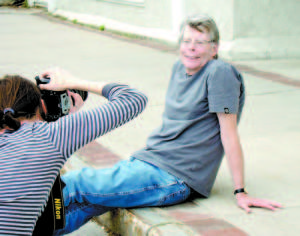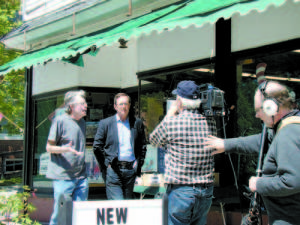Stepping inside Stephen King’s ‘Dome’

A BIG THUMB'S UP — When the New York Times came to Bridgton to interview Stephen King, he told the editors specifically to use The Bridgton News as backdrop. Here, after a long day of interviewing with both the Times (at Rosie's in Lovell) and CBS This Morning (inside the Bridgton Library), King still had energy enough to give thumbs up to the newspaper serving Bridgton — a town he calls the perfect example of "little America." Bridgton is the real-life inspiration for his 2009 epic novel, Under the Dome, to be aired by CBS starting June 24 as a 13-episode TV series.
By Gail Geraghty
Staff Writer
As one of the world's most famous living authors, Stephen King treasures being treated just like anyone else whenever he pulls into downtown Bridgton. As has been his routine for over 30 Maine summers, he makes the half-hour drive into town from his home in Lovell, sometimes with his wife Tabby; more often, alone.
The smiles and small talk flows easily as he goes about his business, which often as not includes a stop at Bridgton Books for a chat, or a walk next door to Main Street Variety, where, he said, “They’ve got great subs.†In small-town Bridgton, where he lived from 1972 to 1979, King is a known quantity, no more unexpected than any other familiar face, however huge his fame.
Most days, King breezes in and out of Bridgton with little or no fanfare. As a writer of over 60 books, many based in western Maine, he likes it best when he can be like a secret agent, observing others instead of being observed.
But last Thursday was far from a usual King visit.
It was a day when King invited the national media to come along, to see the real-life town behind Under the Dome, his 2009 post-apocalyptic epic novel that CBS has adapted as a 13-week summer TV series to begin airing on Monday, June 24, at 10 p.m. The network is betting heavily on the show as the next blockbuster series in the spirit of such hits as Lost, and The Walking Dead. And King, always the pro as well as one of the Dome’s executive producers, is glad to do his part.
On May 16 he drove up from his son Joe Hill’s home in Exeter, N.H. to meet CBS Correspondent Anthony Mason and a crew from CBS This Morning. They filmed an interview inside The Bridgton Public Library. Then King drove to Rosie’s Restaurant in Lovell to meet with New York Times reporter Amy Chosuk, returning to Bridgton by late afternoon so that the Times could photograph him at the location he specifically requested — the marquee in front of The Bridgton News building.
With an ease known only to the most seasoned of celebrities, King gracefully straddled the line between his public and private worlds, if at times all the “commotion,†as he called it, may have seemed a bit strange. Wearing his typical summer attire of a T-shirt and jeans, King served as Bridgton’s ambassador to the world on a beautiful early summer day. He even found time, in between his interviews with the two national journalists, to grant an impromptu third interview, with a local reporter for The News.

KING AT EASE — A photographer takes an upclose shot of author Stephen King, who is sitting on the sidewalk on Main Street in Bridgton. (Geraghty Photos)
When the cameras began rolling inside the library as he sat across from Mason, it was as if King switched on an inner light within his larger-than-life mind, pouring forth with answers showing why he has earned such a huge following of loyal readers and fans.
But before the filming began, King had time for some friendly banter.
“You don’t have to worry about getting my good side, because I don’t have one,†he said as he entered the side door and sat down next to the checkout area. Looking over a row of his books that had been removed from the shelves to use as background on the set, he said, “Oh, you’ve got all my books.â€
Then he noted dryly that his response over the years, whenever librarians have asked him to sign one of his books for the library, is “Not unless you want to lose it.†The signed copies become instant collector’s items, he said, and are never returned.
King said he is pleased with the TV adaptation of the Dome, which uses the book as more of a springboard for ideas than as a literal template for the show. Some of the characters that die in the book live on in the TV show. And the ending? He expects it will be quite different than his, and he’s glad.
“You know, my ending was the weakest part of the book,†said King. The TV town also won’t bear much physical resemblance to Bridgton, designed as it is to appear as any town in small town U.S.A., with even the license plates artfully disguised.
“The show weaves scenes from the book back and forth. It’s a little like a game of Thrones, where everything from the book is there, but sometimes it’s in different places, and different things happen†from the way it was written. “I don’t want it to feel like Network TV,†said King. “It’s a model for the networks that first got premiered on cable TV. I don’t want it to be like NCIS, where it’s basically the same story week after week.
After filming ended, King took Mason on a brief sidewalk stroll from the library past the bookstore and Main Street Variety, up to the Bridgton map on the Southern Maine Retirement Services building that is reproduced with eerie similarity, in the front pages of Under the Dome. He chatted with Mason as he walked in advance of the film crew, stopping at the Bridgton map like a good tour guide to point out places in Bridgton that are duplicated in the book and the TV show.
After wrapping it up with CBS, he invited the local reporter for the News to sit with him for a few minutes on the park bench overlooking Stevens Brook.
Taking time for the local angle

WALKING INTERVIEW — CBS Correspondent Anthony Mason interviewed Maine author Stephen King May 16 inside the Bridgton Public Library, as well as during a walk along Main Street.
“Oh yeah. I love Bridgton. Especially on a day like this,†said King, explaining why its downtown geography and some of its businesses served as inspiration for Chester’s Mill, the town whose residents one October day become mysteriously imprisoned in King’s imagination under a transparent nuclear missile-proof dome.
Besides, he said, when spinning a tale over 1,000 pages long, it’s much easier to write about what you know.
“I know this place. I’ve got the vibe of the way people live here. I lived here myself for a while and I know the feeling of the place,†King said.
Knowing the geography was important too. “When you have a novel with this many characters, it’s nice to know what’s on your left and what’s on your right, and where the streets are,†without really having to think about it, said King. “It made the whole thing a lot more manageable.â€
That’s also why King said he had the dome descend in the fall, after Bridgton’s summer tourists had all left town. And to keep things even more local, King said he had the dome appearing on a weekend, so that a lot of people could be out of town.
“I did have a couple of people come out to be leaf peepers, because it is like a four-seasons community. So they were like my token visitors,†he laughed. “But I did want to stay with the locals.â€
King turned then, perhaps thinking of some of the Dome’s more evil characters, like car dealer Big Jim Rennie, whose surname is a play on Renys department store and who is in no way, shape or form related to Bob Macdonald of Macdonald Motors.
“There’s still so many characters — but they’re not based on anybody from town,†he said in all seriousness, knowing many local readers of the book have thought otherwise.
No, King said, the message he wanted most of all to convey with Under the Dome is simply that “resources are finite on this planet, and that people have to pull together if we are to survive.â€
As King was wrapping up Under the Dome, he said, “Bush and Cheney were still in power,†and if a power-hungry Big Jim Rennie evokes Cheney with his utter ruthlessness, it’s no accident.
“I tried to create a governmental system that was bound to fail†by discarding democracy when crisis descends and imposing a fascist-style rule. “So I just took Bridgton and turned it into a little Chester’s Mill, and then I took Chester’s Mill and said this is “little†America. Because that’s what Bridgton is, is this “little†America,†said King.
If Bridgton was such a perfect setting for a novel, King was asked, why not then for a TV series?
“First of all, your readers should not be disappointed that it wasn't filmed in Bridgton,†said King. “Movies and TV brings income into the area, but it also brings hassles,†like a recent incident near the show’s location in Wilmington, N.C., when some local school children got scared by blank rounds the show shot off for one of its scenes.
“I never had a doubt in the world that the production staff told them that there was going to be blanks fired, but somebody didn't get the message,†King said. Then there’s the hassle to drivers and businesses when sections of town are closed off for filming, he said.
Still, he hopes someday Maine will have its own film commission, like Wilmington does. He said it’s been tried several times in the past, under two different governors, but without success so far.

